新编英语教程_5_Unit_1_教案
高级英语 新编英语教程5 课文+翻译 unit5
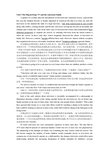
Unit 5 The Plug-in Drug: TV and the American FamilyA quarter of a century after the introduction of television into American society, a period that has seen the medium become so deeply ingrained in American life that in at least one state the television set has attained the rank of a legal necessity, 1safe from repossession in case of debt along with clothes, cooking utensils, and the like, television viewing has become an inevitable and ordinary part of daily life. Only in the early years of television did writers and commentators2have sufficient perspective to separate the activity of watching television from the actual content it offers the viewer. In those early days writers frequently discussed the effects of television on family life. However a curious 3myopia afflicted those early observers: almost without exception they regarded television as a favorable, beneficial, indeed, 4wondrous influence upon the family.在电视机这项发明进入美国人生活的25后,他已经在美国人的生活中根深蒂固,甚至美国至少有一个州的法律规定电视机是生活的必须品,而且如果负债,它可以和衣物,厨具一样免于作为财产抵押,而且看电视也成为人们生活中非常普遍甚至是不可避免的活动。
新编实用英语综合教程1第四版Unit5

Mrs. Parks: 1 _H__o_w__is__th__e_w_e_a_t_h_e_r___ in California?
Student A: It's always warm.
Mrs. Parks: 2 _W__h_a_t_'s__th__e_t_e_m_p_e_r_a_t_u_re___ there?
Student B: The temperature is always about 78 degrees.
Student A: That's the temperature in 3 ___F_a_h_r_e_n_h_e_i_t__. It's the same as 26
degrees 4 _C_e_l_s_iu_s__/_C_e_n_t_i_g_ra_d_e___.
people are very happy when the sun 7 _c_o_m__e_s__o_u_t____.
Back
13 Unit | Five
Speak and Communicate
6 There is going to be a sports meet tomorrow. Bob is worried about the weather and you are talking about it. Fill in the blanks according to the clues given in the brackets. Then act it out with your partner. Bob: I'm wondering if it is going to be fine tomorrow.
5 Unit | Five
综合英语教程(第三版)5电子教案unit1-topic2
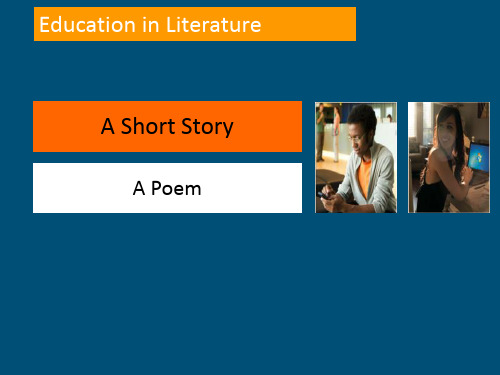
forward to and won’t need me to support them. It all really gets me down.
With such lousy marks on my transcript I couldn’t get into a good cramming class – only into one that’s got kids with really hopeless scores in it. We’re all pretty down about it. One of the boys complained in class, “What crimes have we committed? Why’ve we got to work even harder than adults?” “Your crime was failing the college entrance exams,” the teacher said, “and that’s serious. It isn’t easy for your parents to find the money to send you to this class. You have to feel sorry for them.” He had us all in tears. But who feels sorry for us?
college the only thing for one to do in education? 3. What are the social, economical and cultural reasons for
this nation-wide college mania?
全新版大学英语(第二版)综合教程 第5册 Unit 1 One Writer’s Beginnings

Chronology of Mark Twain’s Life
1835 Born in Florida, Missouri. 1847 Father dies, leaving family in difficult circumstances. 1851 Begins work as a journeyman printer with the
The Wolf and the Lamb
Once upon a time a wolf was lapping at a stream. When he looked up, he saw a lamb drinking a little lower down.
“There’s my supper,” he thought. “I will find some excuse to catch it.” Then he called out to the lamb, “How dare you muddle the water?” “No, master,” said the lamb. “I cannot muddle your water because it runs down from you to me.”
3. Write a short essay about your first favorite book and exchange your essay with your classmates.
Listening Comprehension
Directions: Here are two stories from Aesop’s Fables. Have you ever read them before? Listen to either of them and talk with your fellow students about what you have learned from them.
综合英语教程(第三版)5电子教案unit1-topic3

T1
Read each paragraph below and write a sentence to sum it up.
3 The intelligenceTinhoaefbiclmihtyaildjotrorenpcrowonbictleehnmAtrDaotHfeDAoDinsHnDtaosrpkmasatielt,hnaatsnt drisetqhtuheieyreir show no signs of sseursiotauisneedmaottteionntiaoln.disturbance. According to one view, their diverse symptoms are due to an impaired ability to postpone action in favor of thought. Consequently, they do poorly on tasks requiring sustained attention, and they find it hard to ignore irrelevant information.
more likely to come from homes in which marriages are unhappy
and family stress is high. But researchers agree that a stressful
home life rarely causes ADHD. Instead, the behaviors of these
Main idea?
T1
Read each paragraph below and write a sentence to sum it up.
李观仪《新编英语教程(5)》(第3版)学习指南【词汇短语+课文精解+全文翻译+练习答案】

李观仪《新编英语教程(5)》(第3版)学习指南【词汇短语+课文精解+全文翻译+练习答案】目录Unit 1 一、词汇短语 二、参考译文 三、课文注释 四、练习答案Unit 2 一、词汇短语 二、参考译文 三、课文注释 四、练习答案Unit 3 一、词汇短语 二、参考译文 三、课文注释 四、练习答案Unit 4 一、词汇短语 二、参考译文 三、课文注释 四、练习答案Unit 5 一、词汇短语 二、参考译文 三、课文注释 四、练习答案Unit 6 一、词汇短语 二、参考译文 三、课文注释 四、练习答案Unit 7 一、词汇短语 二、参考译文 三、课文注释 四、练习答案Unit 8 一、词汇短语 二、参考译文 三、课文注释 四、练习答案Unit 9 一、词汇短语 二、参考译文 三、课文注释 四、练习答案Unit 10 一、词汇短语 二、参考译文 三、课文注释 四、练习答案Unit 11 一、词汇短语 二、参考译文 三、课文注释 四、练习答案Unit 12 一、词汇短语 二、参考译文 三、课文注释 四、练习答案弘博学习网————各类考试资料全收录内容简介《新编英语教程(第3版)学习指南》按照原教材的课次进行编写,每单元涉及单元语法、词汇短语、参考译文、课文精解以及练习答案等内容,旨在帮助学生更好、更高效地学习和掌握教材中的重点及难点知识,具有很强的针对性和实用性。
在编写过程中,该书力求突出重点,答疑难点,语言言简意赅,讲解深入浅出,希望它能得到广大英语专业学生和英语自学者的喜爱和认可。
弘博学习网————各类考试资料全收录Unit 1一、词汇短语Text I1clumsy [5klQmzi] adj. moving or doing things in a very awkward way 笨拙的,拙劣的:I spilt your coffee. Sorry—that was clumsy of me.我把你的咖啡弄洒了。
新编英语教程5paraphrase unit1-7
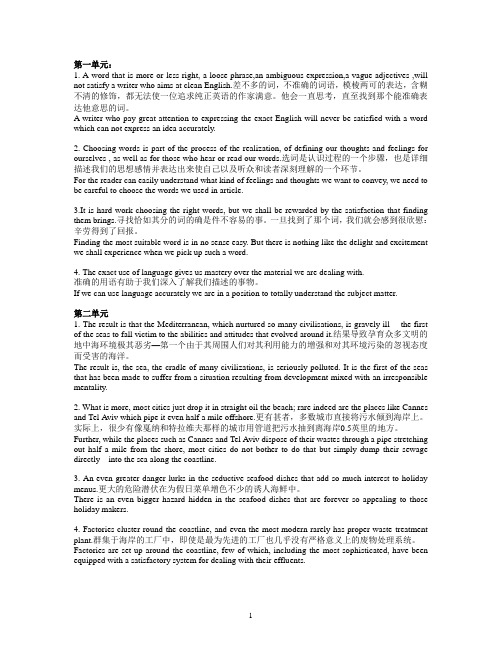
1.A word that is more or less right, a loose phrase,an ambiguous expression,a vague adjectives ,will not satisfy a writer who aims at clean English.差不多的词,不准确的词语,模棱两可的表达,含糊不清的修饰,都无法使一位追求纯正英语的作家满意。
他会一直思考,直至找到那个能准确表达他意思的词。
A writer who pay great attention to expressing the exact English will never be satisfied with a word which can not express an idea accurately.2. Choosing words is part of the process of the realization, of defining our thoughts and feelings for ourselves , as well as for those who hear or read our words.选词是认识过程的一个步骤,也是详细描述我们的思想感情并表达出来使自己以及听众和读者深刻理解的一个环节。
For the reader can easily understand what kind of feelings and thoughts we want to convey, we need to be careful to choose the words we used in article.3.It is hard work choosing the right words, but we shall be rewarded by the satisfaction that finding them brings.寻找恰如其分的词的确是件不容易的事。
新编英语教程(第三版)第一册第五课课件
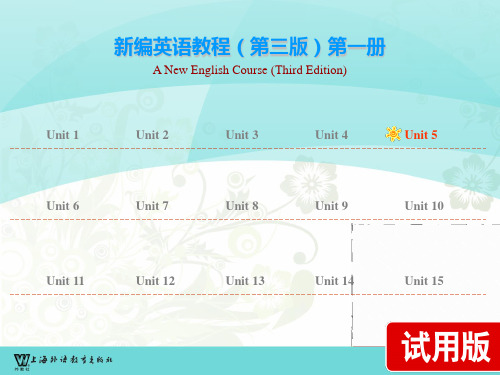
A New English Course (Third Edition)
Unit 1
Unit 2
Unit 3
Unit 4
Unit 5
Unit 6
Unit 7
Unit 8
Unit 9
Unit 10
Unit 11
Unit 12
Unit 13
Unit 14
Unit 15
Unit 5 Save Our Heritage
新编英语教程(第三版)第一册
Unit 5 Save Our Heritage
Lead-In
LSP
Dialogue
Role Play
Reading
Exercises
Language Structures Preparatory Questions Practice I
Practice II Practice III
新编英语教程(第三版)第一册
Unit 5 Save Our Heritage
Lead-In
LSP
Dialogue
Role Play
Reading
Exercises
docent: (AmE) someone who guides visitors through a museum, church, etc.
新编英语教程(第三版)第一册
Unit 5 Save Our Heritage
Lead-In
LSP
Dialogue
Role Play
Reading
Exercises
riffraff: an insulting word for people who are noisy, badlybehaved, or of low social class e.g.: Don’t bring any riffraff into my house! 别把不三不四的人领到我家来!
新编英语教程(第三版)第一册第五课课件

Unit 5 Save Our Heritage
Lead-In LSP Dialogue Role Play Reading Exercises
Larry: Excuse me. Hi. Rebecca: Hi.
Larry: Uh, I’m Larry Daley. I’ve got a job interview with Cecil Fredericks.
docent: (AmE) someone who guides visitors through a museum, church, etc.
新编英语教程(第三r Heritage Lead-In LSP Dialogue Role Play Reading Exercises
Rebecca: Will do, sir. McPhee: Thank you. Rebecca: Dr. McPhee, the museum director.
新编英语教程(第三版)第一册
Unit 5 Save Our Heritage Lead-In LSP Dialogue Role Play Reading Exercises
He asks visitors to keep off the exhibits.
新编英语教程(第三版)第一册
Unit 5 Save Our Heritage Lead-In LSP Dialogue Role Play Reading Exercises
Script
新编英语教程(第三版)第一册
Lead-In LSP Dialogue Role Play Reading Exercises
Rebecca: 26th. Larry: 26th.
McPhee: (claps hands): Eh! Please don’t touch the exhibits! Riffraff. Miss Hutman, I cannot tolerate this type of chaos. I mean, this is a museum, not a...a-a-a... Do you know what “museum” means? I-It doesn’t mean “Oh, daddy, it’s a big tyrannosaurus thing. Can I touch his leg?” No! Work it out, please.
新编英语教程5.unit1知识点
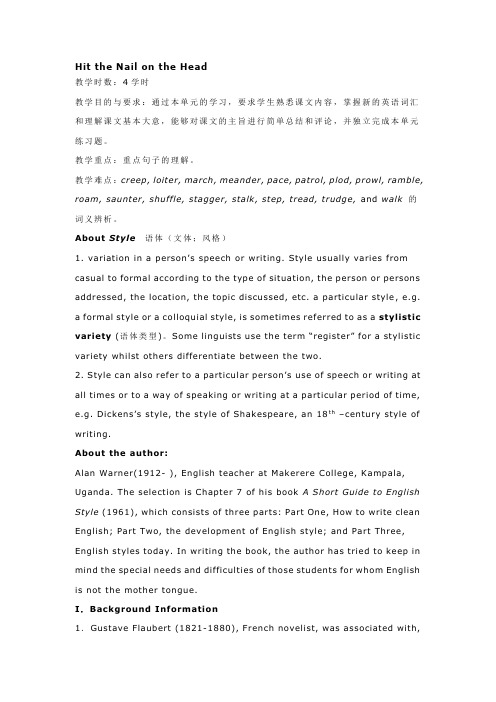
Hit the Nail on the Head教学时数:4学时教学目的与要求:通过本单元的学习,要求学生熟悉课文内容,掌握新的英语词汇和理解课文基本大意,能够对课文的主旨进行简单总结和评论,并独立完成本单元练习题。
教学重点:重点句子的理解。
教学难点:creep, loiter, march, meander, pace, patrol, plod, prowl, ramble, roam, saunter, shuffle, stagger, stalk, step, tread, trudge,and walk的词义辨析。
About Style语体(文体;风格)1. variation in a person‘s speech or writing. Style usually varies from casual to formal according to the type of situation, the person or persons addressed, the location, the topic discussed, etc. a particular style, e.g.a formal style or a colloquial style, is sometimes referred to as a stylistic variety (语体类型)。
Some linguists use the term ―register‖ for a stylistic variety whilst others differentiate between the two.2. Style can also refer to a particular person‘s use of speech or writing at all times or to a way of speaking or writing at a particular period of time, e.g. Dickens‘s style, the style of Shakespeare, an 18th–century style of writing.About the author:Alan Warner(1912- ), English teacher at Makerere College, Kampala, Uganda. The selection is Chapter 7 of his book A Short Guide to English Style (1961), which consists of three parts: Part One, How to write clean English; Part Two, the development of English style; and Part Three, English styles today. In writing the book, the author has tried to keep in mind the special needs and difficulties of those students for whom English is not the mother tongue.I.Background Information1.Gustave Flaubert (1821-1880), French novelist, was associated with,thought not representative of, the movement of naturalism and known as one of the greatest realists of nineteenth-century France. He devoted his life to long hours spent in heavy toil over his work. His writing is marked by exactness and accuracy of observation, e xtreme impersonality and objectivity of treatment, and precision and expressiveness in style, or the principle of the mot juste.2. Mrs. Malaprop is a famous character in Sheridan‘s comedy The Rivals (1775). She is noted for her blunders in the use of word s. ―As headstrong as an allegory (alligator) on the banks of the Nile‖ is one of her grotesque misapplications. She also requests that no delusions (allusions) to the past be made. She has given us the word malapropism as a name for such mistakes.(谢里丹Sheridan,Richard Brinsley, 英国剧作家,政治家。
新编英语教程5_unit1_教学课件
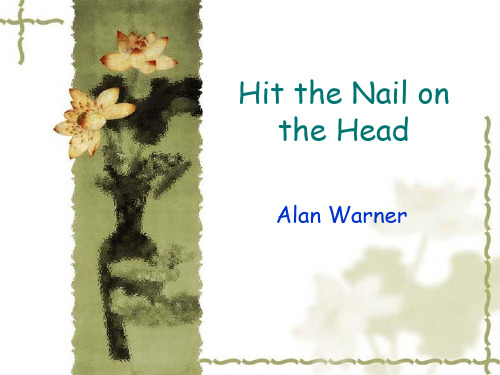
by confusing it with one that resembles it, such as human for humane, singularity for singleness.
3. Hindi(印地语)is a literary and official language of northern India. Swahili(斯瓦希里语)is a Bantu(班图) language that is a trade and governmental language over much of East Africa and in the Congo region. Bantus are people belonging to a group of tribes found in equatorial and southern Africa.
4. Wrong choice of words caused by failure to recognize their connotations (Paragraph 8) Examples: imprison, contain, sum up, epitomize and distill 5. Stylistic differences between synonyms (Paragraph 9)
II. Library Work 1. Gustave Flaubert (1821 – 1880), French novelist, was associated with the movement of naturalism and known as one of the greatest realists of 19th-century France. He devoted his life to long hours spent in heavy toil over his work. His writing is marked by exactness and accuracy of observation, extreme impersonality and objectivity of treatment, and precision and expressiveness in style, or the principle of the mot juste.
Unit 5 Our Weather and Climate.ppt.Convertor新编实用英语综合教程 电子教案 授课计划 教学设计
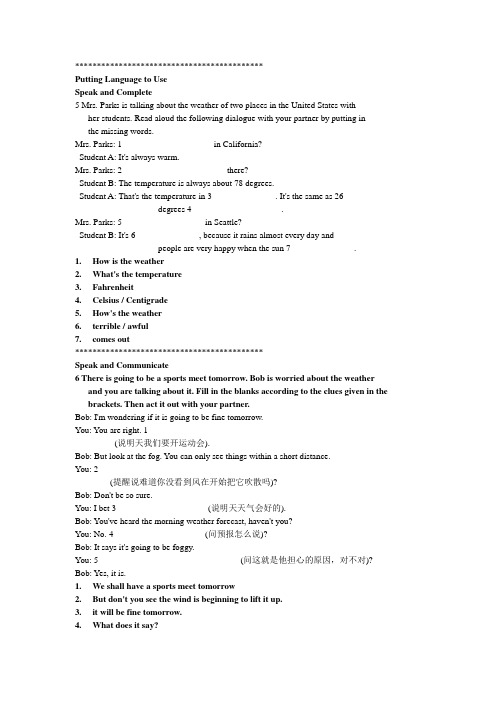
*******************************************Putting Language to UseSpeak and Complete5 Mrs. Parks is talking about the weather of two places in the United States withher students. Read aloud the following dialogue with your partner by putting inthe missing words.Mrs. Parks: 1 ____________________ in California?Student A: It's always warm.Mrs. Parks: 2 _______________________ there?Student B: The temperature is always about 78 degrees.Student A: That's the temperature in 3 ______________. It's the same as 26degrees 4 ____________________.Mrs. Parks: 5 __________________ in Seattle?Student B: It's 6 ______________, because it rains almost every day andpeople are very happy when the sun 7 ______________.1.How is the weather2.What's the temperature3.Fahrenheit4.Celsius / Centigrade5.How's the weather6.terrible / awfules out*******************************************Speak and Communicate6 There is going to be a sports meet tomorrow. Bob is worried about the weatherand you are talking about it. Fill in the blanks according to the clues given in the brackets. Then act it out with your partner.Bob: I'm wondering if it is going to be fine tomorrow.You: You are right. 1 _____________________________________(说明天我们要开运动会).Bob: But look at the fog. You can only see things within a short distance.You: 2 ___________________________________________________(提醒说难道你没看到风在开始把它吹散吗)?Bob: Don't be so sure.You: I bet 3 ____________________ (说明天天气会好的).Bob: You've heard the morning weather forecast, haven't you?You: No. 4 ____________________ (问预报怎么说)?Bob: It says it's going to be foggy.You: 5 _____________________________ (问这就是他担心的原因,对不对)? Bob: Yes, it is.1.We shall have a sports meet tomorrow2.But don't you see the wind is beginning to lift it up.3.it will be fine tomorrow.4.What does it say?5.That's why you're worrying, isn't it?*******************************************Listen and Respond1-f, 2-h, 3-i, 4-j, 5-g, 6-c, 7-e, 8-d, 9-a, 10-b*******************************************Listen and Respond3 Listen to 6 sentences for workplace communication and choose their right responses.Back1) A) I'm sorry. B) It's noisy.C) I'd like to. D) It's wet.2) A) Don't mention it. B) No problem.C) It snows too much. D) It's popular there.3) A) The pleasure is mine. B) There is a chance of rain.C) It's wonderful. D) That's terrible.4) A) Me, too. B) How about you?C) What is it? D) Yes, it is.5) A) Me, too. B) Thank you.C) Not at all. D) That's nothing.6) A) Never mind. B) Many thanks.C) I'm glad to meet you. D) What does the weatherman say?Script1. What's the weather like there?2. What do you think of the weather here?3. What does the weatherman say?4. Hot day, isn't it?5. The heat is killing me. I feel like swimming.6. Is it going to cool down tomorrow?Script:*******************************************Handling a DialogueListen and Decode4 Listen to a dialogue and decode the message by finding out the correct choices in the brackets according to what you have heard.ScriptPat Alex comes by to see Li Hong. They talk about the party last night and about the weather.Li Hong: Hi, Pat! Why didn’t you go to the party last night?Pat: Because it was so cold and rainy.Li Hong: That's too bad! It was a really good party. Hey, why don't we go out for a walk this afternoon, Pat? I need some exercise.Pat: Go out for a walk? But it's so cold out.Li Hong: Cold out? What's the temperature?Pat: About 13℃.Li Hong: 13℃? That's not cold. Just wait until winter.Pat: Why?Li Hong: Well ... it snows a lot and sometimes it's very cold. Last winter it was 7 degrees below zero for three weeks. And it was windy, too.Pat: That sounds awful!Li Hong: It wasn't all that bad. The sun was out almost every*******************************************Understanding a Short Speech / TalkListen and Complete5 Now listen to a short speech / talk and fill up the blanks according to what you have heard. The words in brackets will give you some hints.Ladies and gentlemen, welcome to Dalian, a famous summer resort (避暑胜地) and one of the best 1 ___________ (what?) in China. With clear sky, green mountains, blue seas, fine beaches, clean streets and lovely buildings, our city is 2 _________ (how?). Climate in Dalian is agreeable. It is 3 neither ________________ (how?) nor too hot in summer, with yearly average (平均的) temperature of about 10℃. People here can enjoy moderate (中等的) rainfalls and 4 ________________ (what?), and above all, clean and fresh air with the nice smell of 5 _______ (what?). We've got 6 ___________ (how many?) visitors coming here 7 ________________________ (from where?) every year. I bet you are going to have a great time here as you've just come 8 ______________________ (when?).1.tourist cities2.beautiful3.too cold in winter4.plenty of sunshine5.the sea6.thousands of7.from both home and abroad8.at the best time of year*******************************************Write and Apply Rules4 Analyze the following sentences to see what tenses they belong to.1) I've only been here for ten minutes or so.2) Ted has always worked in an accounting department.3) Mark has worked for this large company for many years.4) John graduated from Florida State University in 1990.5) We had the same weather in Detroit last year.6) He has never made a serious mistake at work.7) What has the weather been like recently?8) Robert went to school part-time while he worked full time.9) Robert has received two promotions so far.10) Robert has decided to look for a job in a larger company.1.PP 现在完成时2.PP3.PP4.P 过去时5.P6.PP7.PP8.P9.PP10.PP*******************************************Write and Correct Mistakes5 Correct the errors in the following sentences.1) They didn't see each other since September.2) Gina is in college for one year.3) She has worked at the cafeteria since nine months.4) He always arrived at his office on time before.5) He never had a problem with his boss.6) Did you ever take the telephone orders before?7) In the last three months, Robert trained more than twenty new employees.8) Robert has started to use a computer when he was an office worker.9) Robert attended several important business meetings in the last three years.10) So far they already got six traveler's checks.1.They haven't seen each other since September.2.Gina has been in college for one year.3.She has worked at the cafeteria for nine months.4.He has always arrived at his office on time before. / He used to have always arrived athis office on time before.5.He has never had a problem with his boss.6.Have you ever taken the telephone orders before?7.In the last three months, Robert has trained more than twenty new employees.8.Robert started to use a computer when he was an office worker.9.Robert has attended several important business meetings in the last three years.10.So far they have already got six traveler's checks.*******************************************6 Translate the following sentences into English.Write and Translate1) 昨天天气不好,实际上这几天天气一直不好。
新编大学英语口语教程1教学课件Unit 5

Part 2 Read Aloud & Answer Questions
Part 3 Individual Presentation
1 Read the following presentation carefully, and pay attention to how the speaker manages to support herself with facts.
Question 2 What would you like to share with your intimate friends? And why?
Question 3
Do you think popular emojis such as and can convey more meanings than words in chatting? Why or why not?
Part 2 Read Aloud & Answer Questions
1 Go over the following passage and read it aloud. You will have 45 seconds to go over the passage and one minute to read it aloud. Pay attention to the pronunciation of each word while reading.
your presentation with facts. Facts are undoubted, proven realities that are grounded in objective evidence, such as statistics, examples, quotations, proverbs and news reports. To support and strengthen statements, facts should be directly related to them and properly cited from reliable sources. Even though a relevant, well-chosen fact functions well as a backup, try to use it in actual need. In the above presentation, to make it well-founded, after each statement, relevant facts are supplied, such as “a monitor for three years in high school”, “a basketball player”, “passed the exams of Social Etiquette and Psychology as elective courses”, and “got the National Psychological Counselor Level 3 Certificate”. All things considered, the listener will consider Hilda as the right person to be the monitor.
新编英语教程5_unit1_教学课件

2.
3.
4.
2. Have you ever heard of the English proverb ―Hit the nail on the head‖? What does it mean? Suggested Answer (SA): It means exactly right in words or action. (The author advises that the English students should try to get the words, phrases and sentences completely right for their purposes in their writing.) 3. Whose job involves hitting nails? Is the text concerned about the carpenter? Then, what’s the major concern of the author? ( stylistic matter, how to choose the right word from the extensive vocabulary of the English language )
I:
1.
Warm-up questions
Does the title strike you as a bit unusual? Have you ever heard of the English proverb ―Hit the nail on the head‖? What does it mean? Whose job involves hitting nails? Is the text concerned about the carpenter? Then, what’s the major concern of the author? What similarities does the author recognize in the job of a carpenter and the work of a writer?
综合英语教程(第三版)5电子教案unit 2-section 1
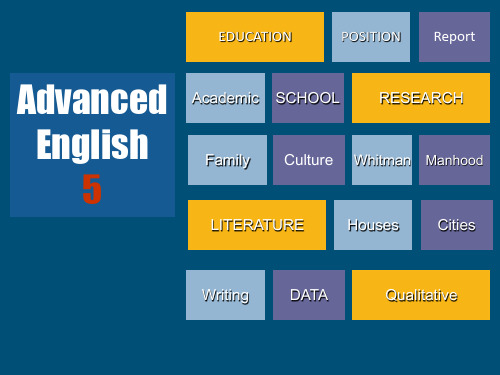
beasts, in ventriloquism, in French and German conversation, in planetary history, in morphology, and in classical Chinese. Actually, the main thing left out of my education was a proper love for my own body, because one feared to cherish anything so obviously mortal and prone to sickness.
aggressive intent. Again the uncle slapped it, scolded it, and sent it away. This treatment went on day after day. After some time, as soon as the kitten saw or smelled that mouse, it screamed and tried to climb up the walls. At that point the uncle lost patience and gave the kitten away, saying that it was stupid and would never learn. Of course the kitten had learned perfectly, and had learned exactly what it had been taught, but unfortunately not what the uncle intended to teach. “I can sympathize with that kitten,” says Chekhov, “because the same uncle tried to teach me Latin.”
综合英语教程(第三版)5电子教案unit1-topic4

4 have it:
accept; take e.g. I’ll have the peas instead of the spinach.
5 stick out:
endure something patiently to the end; put up with something or somebody unpleasant e.g. It was a
the requirements of the curriculum...
7. superintendents: The equivalent of the position is 教育局长 in China.
BACK
8. meeting those...: meeting those requirements as dictated by the curriculum
BACK
15. leave school: graduate (in American English)
BACK
16. Oxbridge: Oxford University and Cambridge University
BACK
17. Yvonne Turner and Amy Acker collaborated in their doctorate research on the Chinese education system when they were teaching English in a Chinese private college. These personal stories were adapted from their research report Education in the New China, published in 2002.
新编英语教程5unit 2text 1
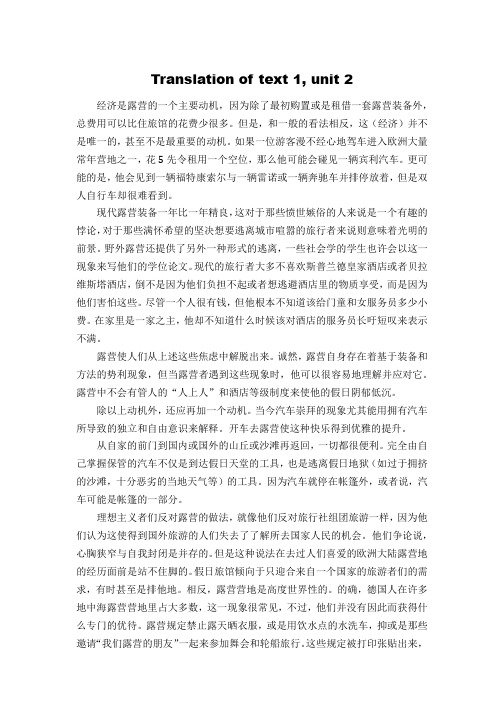
Translation of text 1, unit 2经济是露营的一个主要动机,因为除了最初购置或是租借一套露营装备外,总费用可以比住旅馆的花费少很多。
但是,和一般的看法相反,这(经济)并不是唯一的,甚至不是最重要的动机。
如果一位游客漫不经心地驾车进入欧洲大量常年营地之一,花5先令租用一个空位,那么他可能会碰见一辆宾利汽车。
更可能的是,他会见到一辆福特康索尔与一辆雷诺或一辆奔驰车并排停放着,但是双人自行车却很难看到。
现代露营装备一年比一年精良,这对于那些愤世嫉俗的人来说是一个有趣的悖论,对于那些满怀希望的坚决想要逃离城市喧嚣的旅行者来说则意味着光明的前景。
野外露营还提供了另外一种形式的逃离,一些社会学的学生也许会以这一现象来写他们的学位论文。
现代的旅行者大多不喜欢斯普兰德皇家酒店或者贝拉维斯塔酒店,倒不是因为他们负担不起或者想逃避酒店里的物质享受,而是因为他们害怕这些。
尽管一个人很有钱,但他根本不知道该给门童和女服务员多少小费。
在家里是一家之主,他却不知道什么时候该对酒店的服务员长吁短叹来表示不满。
露营使人们从上述这些焦虑中解脱出来。
诚然,露营自身存在着基于装备和方法的势利现象,但当露营者遇到这些现象时,他可以很容易地理解并应对它。
露营中不会有管人的“人上人”和酒店等级制度来使他的假日阴郁低沉。
除以上动机外,还应再加一个动机。
当今汽车崇拜的现象尤其能用拥有汽车所导致的独立和自由意识来解释。
开车去露营使这种快乐得到优雅的提升。
从自家的前门到国内或国外的山丘或沙滩再返回,一切都很便利。
完全由自己掌握保管的汽车不仅是到达假日天堂的工具,也是逃离假日地狱(如过于拥挤的沙滩,十分恶劣的当地天气等)的工具。
因为汽车就停在帐篷外,或者说,汽车可能是帐篷的一部分。
理想主义者们反对露营的做法,就像他们反对旅行社组团旅游一样,因为他们认为这使得到国外旅游的人们失去了了解所去国家人民的机会。
他们争论说,心胸狭窄与自我封闭是并存的。
全新版大学英语(第二版)综合教程_第五册unit 1
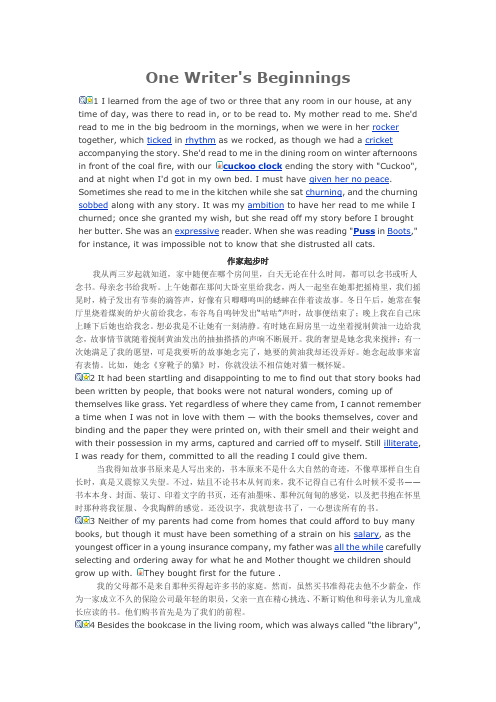
One Writer's Beginnings1 I learned from the age of two or three that any room in our house, at anytime of day, was there to read in, or to be read to. My mother read to me. She'd read to me in the big bedroom in the mornings, when we were in her rocker together, which ticked in rhythm as we rocked, as though we had a cricket accompanying the story. She'd read to me in the dining room on winter afternoons in front of the coal fire, with our cuckoo clock ending the story with "Cuckoo",and at night when I'd got in my own bed. I must have given her no peace. Sometimes she read to me in the kitchen while she sat churning, and the churning sobbed along with any story. It was my ambition to have her read to me while I churned; once she granted my wish, but she read off my story before I brought her butter. She was an expressive reader. When she was reading "Puss in Boots," for instance, it was impossible not to know that she distrusted all cats.作家起步时我从两三岁起就知道,家中随便在哪个房间里,白天无论在什么时间,都可以念书或听人念书。
新编英语教程-5-Unit-1-教案
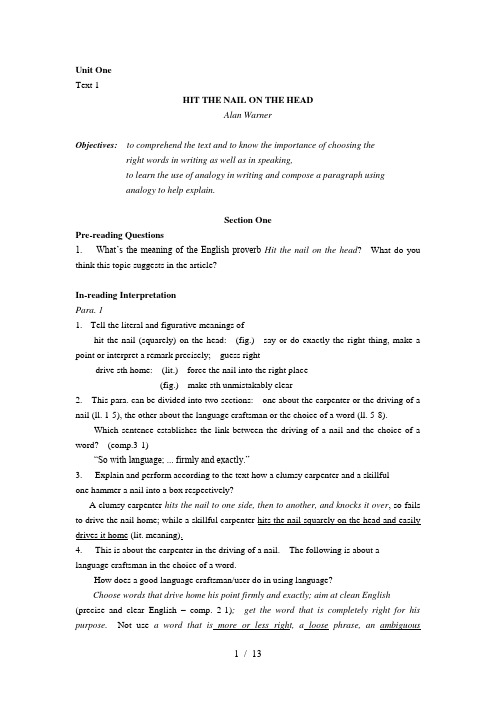
Unit OneText 1HIT THE NAIL ON THE HEADAlan WarnerObjectives: to comprehend the text and to know the importance of choosing theright words in writing as well as in speaking,to learn the use of analogy in writing and compose a paragraph usinganalogy to help explain.Section OnePre-reading Questions1. What’s the meaning of the English proverb Hit the nail on the head? What do you think this topic suggests in the article?In-reading InterpretationPara. 11.Tell the literal and figurative meanings ofhit the nail (squarely) on the head: (fig.) say or do exactly the right thing, make a point or interpret a remark precisely; guess rightdrive sth home: (lit.) force the nail into the right place(fig.) make sth unmistakably clear2. This para. can be divided into two sections: one about the carpenter or the driving of a nail (ll. 1-5), the other about the language craftsman or the choice of a word (ll. 5-8).Which sentence establishes the link between the driving of a nail and the choice of a word? (comp.3-1)“So with language; ... firmly and exactly.”3.Explain and perform according to the text how a clumsy carpenter and a skillfulone hammer a nail into a box respectively?A clumsy carpenter hits the nail to one side, then to another, and knocks it over, so fails to drive the nail home; while a skillful carpenter hits the nail squarely on the head and easily drives it home (lit. meaning).4.This is about the carpenter in the driving of a nail. The following is about a language craftsman in the choice of a word.How does a good language craftsman/user do in using language?Choose words that drive home his point firmly and exactly; aim at clean English (precise and clear English –comp. 2-1); get the word that is completely right for his purpose.Not use a word that is more or less right, a loose phrase, an ambiguousexpression, or a vague adjective. (All the underlined words mean ‘inexact’, ‘inaccurate’.) In other words, a good language user hits the (right) nail on the head and drives his point home (here figuratively).5. A word that is more or less right, a loose phrase, an ambiguous expression, a vague adjective, will not satisfy a writer who aims at clean English (=precise and clear).A writer who is particular about the exactness of an expression in English will never feel happy with a word which fails to express an idea accurately. (LW6-1)or, A writer who wishes to express his ideas precisely will not use the words which are inaccurate. Choose to use those apt vocabularies.Para. 21. What is the meaning of ‘apt’? What does this refer to in The French have an apt phrase for this? (Comp. 3-2) What is the ‘apt phrase’?Apt: well-suited, to the pointThis in the first sentence of the second paragraph refers to the last sentence in the previous paragraph: to get the word that is completely right for this purpose.le mot juste = (French) the correct, right word2. Who is Gustave Flaubert? How much do you know about him? (Lib. W. 1) (refer to [欧洲文学史],(下)pp.140-147) Why does the author say that he is a scrupulous writer?G.Flaubert (1821 - 1880), French novelist, was associated with, though not representative of, the movement of naturalism and known as one of the greatest realists of 19th century France. His masterpieces: Madame Bovary包法利夫人,L’Education Sentimentale情感教育,La Tentation de Saint Antoine圣安东尼的诱惑,纯朴的心He is considered as a scrupulous writer because he spent days trying to get one or two sentences exactly right.He devoted his life to long hours spent in heavy toil over his work. His writing is marked by exactness and accuracy of observation, extreme impersonality and objectivity of treatment, and precision and expressiveness in style, or the principle of the mot juste.2.Why is it so hard to get one or two sentences exactly right?There are many and various words in English language. They are subtle and delicate. They have different shades of meaning and sometimes it is really hard to distinguish the slight differences among synonyms. So it is not enough to have a wide range of vocabulary. We should also know the exact meaning of the words and choose the right words so that we can get our meaning accurately. (ll. 11-15)3. Choosing words is part of the process of realization, of defining our thoughts and feelings for ourselves, as well as for those who hear or read our words. (LW.6-2) realization= fulfilling one’s goal, i.e. to express oneself precisely (comp.2-2)defining our thoughts and feelings for ourselves = getting to know what we are going toexpressfor those who hear or read our words = for our listeners and readers to understand us To a certain extent, the process of finding the right words to use is a process of perfection where you try to search for words that may most accurately express your thoughts and feelings, and words that may most effectively make your listeners and readers understand your thoughts and feelings.Or, Using the right word / le mot juste is one of the stages in the process in which we know our thoughts and feelings clearly and express them precisely, and on the other hand, make our readers and listeners catch what we think and feel accurately. In other words, using the right word can help us to express ourselves exactly, to know what we are going to talk about, and can help our listeners and readers to understand us.4. What’s the meaning of How can I know what I think till I see what I say? Do you think so? Why does the author think it a stupid-sounding question? And why does he think, however, this is true? (Do you agree with the author that there is a great deal of truth in the seemingly stupid question? Why or why not?) (Comp.3-3)It means ‘I can’t get to know my own thoughts before I put them in words.’ (utter it or write it down)Yes, I do. How can a person not know his own thoughts. It sounds irrational that a person does not know what he himself thinks before he sees what he says.This is true in the sense that only after we find the right words to express ourselves exactly can we find our own thoughts clearly. As a matter of fact, it is quite true that unless we have found the exact words to verbalize our own thoughts we can never be very sure of what our thoughts are; without words, our thoughts cannot be defined or stated in a clear and precise manner.Paras. 3 & 41.It is hard work choosing the right words, but we shall be rewarded by the satisfaction that finding them brings.(LW6-3)Finding the most suitable word to use is in no sense easy, but there is nothing like the delight we shall experience when such a word is located.Or, Though it is not easy to find the most suitable word to drive home our points exactly, w e’ll get satisfied / be delighted when we succeed in doing so.2. The exact use of language gives us mastery over the material we are dealing with. (LW 6-4)Once we are able to use language accurately, we are in a position to fully understand our subject matter.Or, Using the apt word indicates that we can fully understand what we are dealing with / talking about.3.Tell the examples in paras. 3 & 4 and the purpose of using them.The example in para. 3 demonstrates: once you are able to find the mot juste to describe the limitation of this fellow, you know what sort of man he really is. (ll.24-5)In other words, the reason why you can’t find the right word is that you don’t have a clear mind of the thing you are going to describe. This example illustrates the point How can I know what I think till I see what I say? in para. 2.So from this example of a man searching for the right word for his feelings about his friend, we know that the function that words perform is to define our thoughts and feelings for ourselves and to define our thoughts and feelings for those who hear us. (comp. 2-3, C) 4. The example in para. 4 indicates the same viewpoint:You will be in a disadvantageous position when someone knows your name but you don’t know his, because he is clear who he is dealing with while you aren’t so that he has the kind of advantage to control you, as the last sentence states: Command of words is ultimately command over life and experience.Paras 5-12In these paras. specific examples are given to demonstrate the significance of hitting the nail on the head in communication. Tell the examples in your own words. Distinguish the following pairs of words and sentences.1. (para.5) Do human and humane mean the same? What are the meanings of human action and humane action, human killer and humane killer?human [`hju:men] = of, characterizing, or relating to manhumane [hju:`mein] = characterized by kindness, mercy, sympathyThushuman action = action taken by manhumane action = merciful actionhuman killer = person that kills humanshumane killer = sth that kills but causes little paine.g. - the Declaration of Human / Humane Right ?- Helping that blind man to cross the street is a very ________ thing to do. (human, humane)- We believe in __________ treatment of prisoner. (human, humane)humanity: mankind, human nature, quality of being humanehumanism, humanist, humanitarian; humanizeTheir origin is the same and their meanings are related, but their usage is distinct. i.e. They are of the same origin / root, but of semantic difference.2. (para.6) What is the difference in meaning or usage between anxiety and eagerness?anxiety = a kind of worry and fear about sth that will / is likely to happen in the future.eagerness = sort of desire or wishThey have some kinship with each other, but cannot be substituted by each other.e.g. - My anxiety grew when my 7-year-old son hadn’t returned by nightfall.- Not knowing whether or not he would be admitted to the university caused the whole family great anxiety.- When the box of chocolate is passed around, David is waiting with intense eagerness.- Her hands trembled with anxiety / eagerness as she opened the letter. (different senses with different words)3. (paras. 7, 8) What’s the difference between singularity and singleness?singular = outstanding and extraordinary, very strange and peculiar, uncommon (denotation)singularit y = oddity, peculiarity, sth. that singles a man out from other mensingle = only one and no more, solitary, separate, individuale.g. - singular behavior / dress / opinion- single-minded: steadfast or firm to the purpose in mind, / single dressThese two words also have the same root but different senses.4. (para. 9) Look at the sentence All that was ever thought or written about Christmas is imprisoned in this sentence... Why is imprisoned not the “mot juste”? Why are the words contained, summed up, epitomized and distilled better than imprisoned in this sentence?The word imprison‘suggests to put in with force, coercion (pressure, compulsion) as if the meaning were held against its will.’ (l.59)Contain and sum up are more commonly used.Epitomize has the same semantic meaning with contained and summed up, but it is rather a clumsy-sound word, because it is too academic, more formal, so inappropriate in this informal context.Distill means to leave out the impurities and make purifying essence (e.g. distilled water), so the essence of the meaning of this sentence can be better expressed in the following sentence: The essence of all that was ever thought or written about Christmas is distilled in this sentence.5.(para.10) Tell the differences betweenIn my childhood I loved to watch trains go by.When I was a child I loved watching trains go by.and He died poor.He expired in indigent circumstances.a. At first glance these two sentences are exactly the same. But look more closely and you will see that there are very tiny differences.in my childhood - more abstract than when I was a childwatching - more emphasis on the action of looking at trains than to watchin one’s childhood / adolescence / youth / adulth ood / old agesb. He died poor.He expired in indigent circumstancesThese two sentences are of similar lexical interpretations, but the feelings each of them gives the reader are quite different since the words are changed. The first is a rather common statement, nothing special is contained in it while the latter epitomizes strong emotion, which may arouse the reader a kind of sympathy. So The change in words is a change in style, and the effect on the reader is quite different, as Prof. Ralei gh stated:’ There are no synonyms, and the same statement can never be repeated in a changed form of words.’Therefore, as para.10 concludes, we should ‘increase our skills’ in using the right word for our purpose and increase our ‘sensitivity’ with the sh ades of difference in vocabulary.Section Two6.(Para.11) The study of words, of their origins and shifting meanings, can tell us agreat deal about human life and thought. It is difficult and sometimes impossible to translate a word from one language into another. Why? Supply some such examples with English and Chinese. (comp.3-7)Those are words denoting notions which are existent only in specific cultures, not universally shared by all cultures.English words difficult to be turned into Chinese: privacy, party, lobby(v.), highlight, etc.Chinese words difficult to be turned into English: 吹风会,粽子,五保户, 五讲四美,etc.Comp. 2-5: The examples of untranslatability of some words given in this para. Best illustrate: the 3rd sentence7. (Para.12) Another reason for increasing our skills and sensitivity is that: there are many synonyms in English language, i.e. different words bearing the similar meaning.LW1, 2 & 48.What do all these specific examples serve in this article?to support the main ideas. Remember the title is Hit the nail on the head, a proverb which indicates here to use the exact words to express oneself, or to express your right meaning by using the precise words.Para.13What does the writer conclude in the last paragraph? Retell this paragraph in your own words.Better know two words exactly than three vaguely.Post-reading Discussion1.Can you draw the main ideas of this article?One must be able to choose the right word from the extensive vocabulary of the English language to facilitate one’s own process of cognition and one’s communication with others. (Comp. 1-B)Section ThreeAnalysis1.Encourage the students to make their presentation on analogy. (10 mins.)What is an analogy? What’s the a dvantage of using it / when is it necessary to use it? Illustrate it by analyzing the text or give your own examples.Analogy is a special kind of comparison and a more concrete way to explain things. Like comparison, analogy shows similarities, but unlike comparison, analogy aims at what is common between two things of different classes. e.g. (P.7)We are likely to turn to an analogy to bring it to life when we have to explain sth vast, remote, abstract or specialized. e.g. (P7)2. Ask the whole class to identify the places where the analogy is referred to in the article. (Comp.3-8) (10 mins.)3. Supply more analogies showing the use of analogies. (10 mins.)Suppose you are going to write a passage discussing the learning of a foreign language. Use an analogy to help you explain. (LW 7)Text II The Maker’s Eye: Revising Your Own ManuscriptsDonald M. MurrayQuestions for individual pre-class work:1. What difference is there between the professional writers and the amateurs? What does Murray mean by Writers must learn to be their own best enemy? (paras. 1, 2, 3, 4)A professional regards the 1st draft as the beginning of the job, ‘the 0 draft’, never finishedAn amateur as the end of the job, done, finishedWriters must learn to be fastidious and exacting, i.e., severely critical with their own writing.2.What does a professional writer usually do when finishing his first draft? Identify thesenten-ces in paras. 2-6.(para. 2) discover what they have to say and how best they can say.(para. 3) say more and say it more clearly,change and rearrange the words to avoid confusionand clarify meaning(para. 4) accept criticism and praise of others and be suspicious of it(para. 5) detach themselves from their own pages, then reread hem as strangers(para. 6) be critical of everything, be passion-hot and critic-cold simultaneously(para. 8) be critical and constructive simultaneously, to cut what is bad and to reveal what is good so that in the end the writing still maintains its original freshness and spontaneity.3.What is the problem arising for the writers doing these kind of work and for the majorityofstudents? (para. 7)They are overly too critical to complete a draft, tear up page after page, think everything dreadful, see the task as hopeless4.What are the possible ways of rewriting for writers? (paras. 11-2)A few writers seem to do little rewriting, but they create and review the invisible drafts in their minds before approaching the page.Some writers revise page by page.Most writers revise draft by draft, catching the larger problems of subject and form, then moving in closer and closer.5. What are the 8 points that M. thinks writers must consider when revising their drafts? How do you explain them?Information, meaning, audience, form, structure, development, dimension, voice. Refer to paras.13-20.6. What else does M. think a writer should do in revising apart from these 8 points?(para.21) Line-by-line editing. Study individually all the clauses, phrases, words, and even the punctuation marks.(para. 22) once a word is changed, … all the words used … must be considered and reconsidered.(para. 23) read aloud / mutter to himself part of his manuscript at a certain stage of revising, because our ears are very good judges of language, being sensitive to the flow of words. What is right should sound right, and what sound right should be right.(para. 25) choose the precise word for words have double, triple, even quadruple meanings.(para. 26) from word to phrase to sentence to paragraph, then backward, to achieve variety, balance, coherence, unity, emphasis, firmer structure and appropriate form7. How does M. End his essay? Comment on the way M. concludes his essay. (para. 30)The apparently unfinished essay is a good illustration of his idea that a piece of writing is never really finished, it can always be re-read, and re-written, with sth deleted and sth added. 8. What will you be benef ited in your writing practice if you follow M’s suggestions?Group work and class presentation:Gp1: Work out a presentation of paras. 1-12 based on questions 1-4.Gp 2: Work out a presentation of paras. 13-26 based on questions 5-6.Class discussion on Qs. 7-8.Questions on TEXT II, UNIT I for pre-class work:1. What difference is there between the professional writers and the amateurs? What does Murray mean by Writers must learn to be their own best enemy? (paras. 1, 2, 3, 4)2.What does a professional writer usually do whenfinish-ing his first draft? Identify the sentences in paras. 2-6, 8?3.What is the problem arising for the writers doing these kind of work and for the majority of students? (para. 7)4.What are the possible ways of rewriting for writers? (paras. 11-2)5. What are the 8 points that M. thinks writers must consider when revising their drafts? How do you explain them? (paras. 13-20)6. What else does M. think a writer should do in revising apart from these 8 points?(paras.21-6)7. How does M. End his essay? Comment on the way M. concludes his essay. (paras. 27-30)8. What will you be benefited in your writing practice if you follow M’s suggestions?Unit 1-1Para.1--- Comp. 2-1, 3-1--- Tell the literal and figurative meani ngs of ‘hit the nail on the head’ and ‘drive sth home’.Para. 2--- Comp. 2-2, 3-2, 3, LW6 – 2--- Who is Gustave Flaubert? How much do you know about him? Why does the author say that he is a scrupulous writer?Para. 3--- Comp. 2-3, LW6 – 3, 4--- What does the example in para. 3 demonstrate? Para. 4--- Why will you be at a slight disadvantage if someone knows your name but you don’t know his?Paras. 5-10--- Distinguish the following pairs of words andsentences and explain what the author demonstrates by making all these examples.- human & humane, anxiety & eagerness, singularity & singleness,- imprison & contain, sum up, epitomize, distill - In my childhood I loved to watch trains go by. & When I was a child I loved watching trains go by.- He dies poor.& He expired in indigent circumstances. Para. 11--- Comp. 2-5, 3-7Para. 12--- Make a careful distinction among the words given in para. 12 and complete LW1.Para. 13--- What does the author conclude in the lastparagraph?e.g. The writer, at the conclusion, uses repetition and parallelism to drive home the thesis so that no one who has read this article can ever forget.1. hit the (right) nail on the head / hit it = guess right, say or do exactly the right thing, make a point or interpret a remark preciselye.g. - Jane’s father hit the nail on the head when he said that her chief fault was vanity.- The report spoke of corruption, which hit the nail squarely on the head.- You’ve hit it.[文档可能无法思考全面,请浏览后下载,另外祝您生活愉快,工作顺利,万事如意!]。
- 1、下载文档前请自行甄别文档内容的完整性,平台不提供额外的编辑、内容补充、找答案等附加服务。
- 2、"仅部分预览"的文档,不可在线预览部分如存在完整性等问题,可反馈申请退款(可完整预览的文档不适用该条件!)。
- 3、如文档侵犯您的权益,请联系客服反馈,我们会尽快为您处理(人工客服工作时间:9:00-18:30)。
Unit OneText 1HIT THE NAIL ON THE HEADAlan WarnerObjectives: to comprehend the text and to know the importance of choosing the right words in writing as well as in speaking,to learn the use of analogy in writing and compose a paragraph usinganalogy to help explain.Section OnePre-reading Questions1. What‟s the meaning of the English proverb Hit the nail on the head? What do you think this topic suggests in the article?In-reading InterpretationPara. 11.Tell the literal and figurative meanings ofhit the nail (squarely) on the head: (fig.) say or do exactly the right thing, make a point or interpret a remark precisely; guess rightdrive sth home: (lit.) force the nail into the right place(fig.) make sth unmistakably clear2. This para. can be divided into two sections: one about the carpenter or the driving of a nail (ll. 1-5), the other about the language craftsman or the choice of a word (ll. 5-8).Which sentence establishes the link between the driving of a nail and the choice of a word? (comp.3-1)“So with language; ... firmly and exactly.”3.Explain and perform according to the text how a clumsy carpenter and a skillful one hammer a nail into a box respectively?A clumsy carpenter hits the nail to one side, then to another, and knocks it over, so fails to drive the nail home; while a skillful carpenter hits the nail squarely on the head and easily drives it home (lit. meaning).4.This is about the carpenter in the driving of a nail. The following is about a language craftsman in the choice of a word.How does a good language craftsman/user do in using language?Choose words that drive home his point firmly and exactly; aim at clean English (precise and clear English – comp. 2-1); get the word that is completely right for his purpose.Not use a word that is more or less right, a loose phrase, an ambiguous expression, or a vague adjective. (All the underlined words mean …inexact‟, …inaccurate‟.)In other words, a good language user hits the (right) nail on the head and drives his point home (here figuratively).5. A word that is more or less right, a loose phrase, an ambiguous expression, a vague adjective, will not satisfy a writer who aims at clean English (=precise and clear).A writer who is particular about the exactness of an expression in English will never feel happy with a word which fails to express an idea accurately. (LW6-1) or, A writer who wishes to express his ideas precisely will not use the words which are inaccurate. Choose to use those apt vocabularies.Para. 21. What is the meaning of …apt‟? What does this refer to in The French have an apt phrase for this? (Comp. 3-2) What is the …apt phrase‟?Apt: well-suited, to the pointThis in the first sentence of the second paragraph refers to the last sentence in the previous paragraph: to get the word that is completely right for this purpose.le mot juste = (French) the correct, right word2. Who is Gustave Flaubert? How much do you know about him? (Lib. W. 1) (refer to [欧洲文学史],(下)pp.140-147) Why does the author say that he is a scrupulous writer?G.Flaubert (1821 - 1880), French novelist, was associated with, though not representative of, the movement of naturalism and known as one of the greatest realists of 19th century France. His masterpieces: Madame Bovary包法利夫人,L‟Education Sentimentale情感教育,La Tentation de Saint Antoine圣安东尼的诱惑,纯朴的心He is considered as a scrupulous writer because he spent days trying to get one or two sentences exactly right.He devoted his life to long hours spent in heavy toil over his work. His writing is marked by exactness and accuracy of observation, extreme impersonality and objectivity of treatment, and precision and expressiveness in style, or the principle of the mot juste.2.Why is it so hard to get one or two sentences exactly right?There are many and various words in English language. They are subtle anddelicate. They have different shades of meaning and sometimes it is really hard to distinguish the slight differences among synonyms. So it is not enough to have a wide range of vocabulary. We should also know the exact meaning of the words and choose the right words so that we can get our meaning accurately. (ll. 11-15)3. Choosing words is part of the process of realization, of defining our thoughts and feelings for ourselves, as well as for those who hear or read our words. (LW.6-2) realization= fulfilling one‟s goal, i.e. to express oneself precisely (comp.2-2) defining our thoughts and feelings for ourselves = getting to know what we are going to expressfor those who hear or read our words= for our listeners and readers to understand usTo a certain extent, the process of finding the right words to use is a process of perfection where you try to search for words that may most accurately express your thoughts and feelings, and words that may most effectively make your listeners and readers understand your thoughts and feelings.Or, Using the right word / le mot juste is one of the stages in the process in which we know our thoughts and feelings clearly and express them precisely, and on the other hand, make our readers and listeners catch what we think and feel accurately. In other words, using the right word can help us to express ourselves exactly, to know what we are going to talk about, and can help our listeners and readers to understand us.4. What‟s the meaning of How can I know what I think till I see what I say? Do you think so? Why does the author think it a stupid-sounding question? And why does he think, however, this is true? (Do you agree with the author that there is a great deal of truth in the seemingly stupid question? Why or why not?) (Comp.3-3) It means …I can‟t get to know my own thoughts before I put them in words.‟ (utter it or write it down)Yes, I do. How can a person not know his own thoughts. It sounds irrational that a person does not know what he himself thinks before he sees what he says.This is true in the sense that only after we find the right words to express ourselves exactly can we find our own thoughts clearly. As a matter of fact, it is quite true that unless we have found the exact words to verbalize our own thoughts we can never be very sure of what our thoughts are; without words, our thoughts cannot be defined or stated in a clear and precise manner.Paras. 3 & 41.It is hard work choosing the right words, but we shall be rewarded by the satisfaction that finding them brings.(LW6-3)Finding the most suitable word to use is in no sense easy, but there is nothing like the delight we shall experience when such a word is located.Or, Though it is not easy to find the most suitable word to drive home our points exactly, w e‟ll get satisfied / be delighted when we succeed in doing so.2. The exact use of language gives us mastery over the material we are dealing with. (LW 6-4)Once we are able to use language accurately, we are in a position to fully understand our subject matter.Or, Using the apt word indicates that we can fully understand what we are dealing with / talking about.3.Tell the examples in paras. 3 & 4 and the purpose of using them.The example in para. 3 demonstrates: once you are able to find the mot juste to describe the limitation of this fellow, you know what sort of man he really is. (ll.24-5) In other words, the reason why you can‟t find the right word is that you don‟t have a clear mind of the thing you are going to describe. This example illustrates the point How can I know what I think till I see what I say? in para. 2.So from this example of a man searching for the right word for his feelings about his friend, we know that the function that words perform is to define our thoughts and feelings for ourselves and to define our thoughts and feelings for those who hear us. (comp. 2-3, C)4. The example in para. 4 indicates the same viewpoint:You will be in a disadvantageous position when someone knows your name but you don‟t know his, because he is clear who he is dealing with while you aren‟t so that he has the kind of advantage to control you, as the last sentence states: Command of words is ultimately command over life and experience.Paras 5-12In these paras. specific examples are given to demonstrate the significance of hitting the nail on the head in communication. Tell the examples in your own words. Distinguish the following pairs of words and sentences.1. (para.5) Do human and humane mean the same? What are the meanings of human action and humane action, human killer and humane killer?human [`hju:men] = of, characterizing, or relating to manhumane [hju:`mein] = characterized by kindness, mercy, sympathyThushuman action = action taken by manhumane action = merciful actionhuman killer = person that kills humanshumane killer = sth that kills but causes little paine.g. - the Declaration of Human / Humane Right ?- Helping that blind man to cross the street is a very ________ thing to do. (human, humane)- We believe in __________ treatment of prisoner. (human, humane)humanity: mankind, human nature, quality of being humanehumanism, humanist, humanitarian; humanizeTheir origin is the same and their meanings are related, but their usage is distinct.i.e. They are of the same origin / root, but of semantic difference.2. (para.6) What is the difference in meaning or usage between anxiety and eagerness?anxiety = a kind of worry and fear about sth that will / is likely to happen in the future.eagerness = sort of desire or wishThey have some kinship with each other, but cannot be substituted by each other.e.g. - My anxiety grew when my 7-year-old son hadn‟t returned by nightfall.- Not knowing whether or not he would be admitted to the university caused the whole family great anxiety.- When the box of chocolate is passed around, David is waiting with intense eagerness.- Her hands trembled with anxiety / eagerness as she opened the letter. (different senses with different words)3. (paras. 7, 8) What‟s the difference between singularity and singleness?singular = outstanding and extraordinary, very strange and peculiar, uncommon (denotation)singularit y = oddity, peculiarity, sth. that singles a man out from other mensingle = only one and no more, solitary, separate, individuale.g. - singular behavior / dress / opinion- single-minded: steadfast or firm to the purpose in mind, / single dress These two words also have the same root but different senses.4. (para. 9) Look at the sentence All that was ever thought or written aboutChristmas is imprisoned in this sentence... Why is imprisoned not the “mot juste”? Why are the words contained, summed up, epitomized and distilled better than imprisoned in this sentence?The word imprison…suggests to put in with force, coercion (pressure, compulsion) as if the meaning were held against its will.‟ (l.59)Contain and sum up are more commonly used.Epitomize has the same semantic meaning with contained and summed up, but it is rather a clumsy-sound word, because it is too academic, more formal, so inappropriate in this informal context.Distill means to leave out the impurities and make purifying essence (e.g. distilled water), so the essence of the meaning of this sentence can be better expressed in the following sentence: The essence of all that was ever thought or written about Christmas is distilled in this sentence.5.(para.10) Tell the differences betweenIn my childhood I loved to watch trains go by.When I was a child I loved watching trains go by.and He died poor.He expired in indigent circumstances.a. At first glance these two sentences are exactly the same. But look more closely and you will see that there are very tiny differences.in my childhood - more abstract than when I was a childwatching - more emphasis on the action of looking at trains than to watchin one‟s childhood / adolescence / youth / adulth ood / old agesb. He died poor.He expired in indigent circumstancesThese two sentences are of similar lexical interpretations, but the feelings each of them gives the reader are quite different since the words are changed. The first is a rather common statement, nothing special is contained in it while the latter epitomizes strong emotion, which may arouse the reader a kind of sympathy. So The change in words is a change in style, and the effect on the reader is quite different, as Prof. Raleigh stated:’ There are no synonyms, and the same statement can never be repeated in a changed form of words.’Therefore, as para.10 concludes, we should …increase our skills‟ in using the right word for our purpose and increase our …sensitivity‟ with the sh ades of difference in vocabulary.Section Two6.(Para.11) The study of words, of their origins and shifting meanings, can tell us a great deal about human life and thought. It is difficult and sometimes impossible to translate a word from one language into another. Why? Supply some such examples with English and Chinese. (comp.3-7)Those are words denoting notions which are existent only in specific cultures, not universally shared by all cultures.English words difficult to be turned into Chinese: privacy, party, lobby(v.), highlight, etc.Chinese words difficult to be turned into English: 吹风会,粽子,五保户, 五讲四美,etc.Comp. 2-5: The examples of untranslatability of some words given in this para. Best illustrate: the 3rd sentence7. (Para.12) Another reason for increasing our skills and sensitivity is that: there are many synonyms in English language, i.e. different words bearing the similar meaning.LW1, 2 & 48.What do all these specific examples serve in this article?to support the main ideas. Remember the title is Hit the nail on the head,a proverb which indicates here to use the exact words to express oneself, or to express your right meaning by using the precise words.Para.13What does the writer conclude in the last paragraph? Retell this paragraph in your own words.Better know two words exactly than three vaguely.Post-reading Discussion1.Can you draw the main ideas of this article?One must be able to choose the right word from the extensive vocabulary of the English language to facilitate one‟s own process of cognition and one‟s communication with others. (Comp. 1-B)Section ThreeAnalysis1.Encourage the students to make their presentation on analogy. (10 mins.)What is an analogy? What‟s the advantage of using it / when is it necessary to useit? Illustrate it by analyzing the text or give your own examples.Analogy is a special kind of comparison and a more concrete way to explain things. Like comparison, analogy shows similarities, but unlike comparison, analogy aims at what is common between two things of different classes. e.g. (P.7) We are likely to turn to an analogy to bring it to life when we have to explain sth vast, remote, abstract or specialized. e.g. (P7)2. Ask the whole class to identify the places where the analogy is referred to in the article. (Comp.3-8) (10 mins.)3. Supply more analogies showing the use of analogies. (10 mins.)Suppose you are going to write a passage discussing the learning of a foreign language. Use an analogy to help you explain. (LW 7)Text II The Maker’s Eye: Revising You r Own ManuscriptsDonald M. MurrayQuestions for individual pre-class work:1. What difference is there between the professional writers and the amateurs? What does Murray mean by Writers must learn to be their own best enemy? (paras. 1, 2, 3, 4)A professional regards the 1st draft as the beginning of the job, …the 0 draft‟, never finishedAn amateur as the end of the job, done, finishedWriters must learn to be fastidious and exacting, i.e., severely critical with their own writing.2.What does a professional writer usually do when finishing his first draft? Identifythe senten-ces in paras. 2-6.(para. 2) discover what they have to say and how best they can say.(para. 3) say more and say it more clearly,change and rearrange the words to avoid confusionand clarify meaning(para. 4) accept criticism and praise of others and be suspicious of it(para. 5) detach themselves from their own pages, then reread hem as strangers(para. 6) be critical of everything, be passion-hot and critic-cold simultaneously(para. 8) be critical and constructive simultaneously, to cut what is bad and to reveal what is good so that in the end the writing still maintains its original freshness and spontaneity.3.What is the problem arising for the writers doing these kind of work and for themajority ofstudents? (para. 7)They are overly too critical to complete a draft, tear up page after page, think everything dreadful, see the task as hopeless4.What are the possible ways of rewriting for writers? (paras. 11-2)A few writers seem to do little rewriting, but they create and review the invisibledrafts intheir minds before approaching the page.Some writers revise page by page.Most writers revise draft by draft, catching the larger problems of subject and form, then moving in closer and closer.5. What are the 8 points that M. thinks writers must consider when revising their drafts? How do you explain them?Information, meaning, audience, form, structure, development, dimension, voice. Refer to paras.13-20.6. What else does M. think a writer should do in revising apart from these 8 points?(para.21) Line-by-line editing. Study individually all the clauses, phrases, words, and even the punctuation marks.(para. 22) once a word is changed, … all the words used … must be considered and reconsidered.(para. 23) read aloud / mutter to himself part of his manuscript at a certain stage of revising, because our ears are very good judges of language, being sensitive to the flow of words. What is right should sound right, and what sound right should be right.(para. 25) choose the precise word for words have double, triple, even quadruple meanings.(para. 26) from word to phrase to sentence to paragraph, then backward, to achieve variety, balance, coherence, unity, emphasis, firmer structure and appropriate form7. How does M. End his essay? Comment on the way M. concludes his essay. (para.30)The apparently unfinished essay is a good illustration of his idea that a piece of writing is never really finished, it can always be re-read, and re-written, with sth deleted and sth added.8. What will you be benefited in your writing practice if you follow M‟s suggestions? Group work and class presentation:Gp1: Work out a presentation of paras. 1-12 based on questions 1-4.Gp 2: Work out a presentation of paras. 13-26 based on questions 5-6.Class discussion on Qs. 7-8.Questions on TEXT II, UNIT I for pre-class work: 1. What difference is there between the professional writers and the amateurs? What does Murray mean by Writers must learn to be their own best enemy? (paras. 1, 2, 3, 4)2.What does a professional writer usually do whenfinish-ing his first draft? Identify the sentences in paras. 2-6, 8?3.What is the problem arising for the writers doingthesekind of work and for the majority of students? (para.7)4.What are the possible ways of rewriting for writers? (paras. 11-2)5. What are the 8 points that M. thinks writers mustconsider when revising their drafts? How do you explain them? (paras. 13-20)6. What else does M. think a writer should do in revising apart from these 8 points?(paras.21-6)7. How does M. End his essay? Comment on the way M. concludes his essay. (paras. 27-30)8. What will you be benefited in your writing practice if you follow M‟s suggestions?Unit 1-1Para.1--- Comp. 2-1, 3-1--- Tell the literal and figurative meanings of …hit the nail on the head‟ and …drive sth home‟. Para. 2--- Comp. 2-2, 3-2, 3, LW6 – 2--- Who is Gustave Flaubert? How much do you know about him? Why does the author say that he is a scrupulous writer?Para. 3--- Comp. 2-3, LW6 – 3, 4--- What does the example in para. 3 demonstrate?Para. 4--- Why will you be at a slight disadvantage if someo ne knows your name but you don‟t know his?Paras. 5-10--- Distinguish the following pairs of words andsentences and explain what the author demonstrates by making all these examples.- human & humane, anxiety & eagerness, singularity & singleness,- imprison & contain, sum up, epitomize, distill- In my childhood I loved to watch trains goby.& When I was a child I loved watching trains go by.- He dies poor.& He expired in indigent circumstances. Para. 11--- Comp. 2-5, 3-7Para. 12--- Make a careful distinction among the words given in para. 12 and complete LW1.Para. 13--- What does the author conclude in the last paragraph?e.g. The writer, at the conclusion, uses repetition and parallelism to drive home the thesis so that no one who has read this article can ever forget.1. hit the (right) nail on the head / hit it = guess right, say or do exactly the right thing, make a point or interpret a remark preciselye.g. - Jane‟s father hit the nail on the head when he said that her chief fault was vanity.- The report spoke of corruption, which hit the nail squarely on the head.- You‟ve hit it.。
